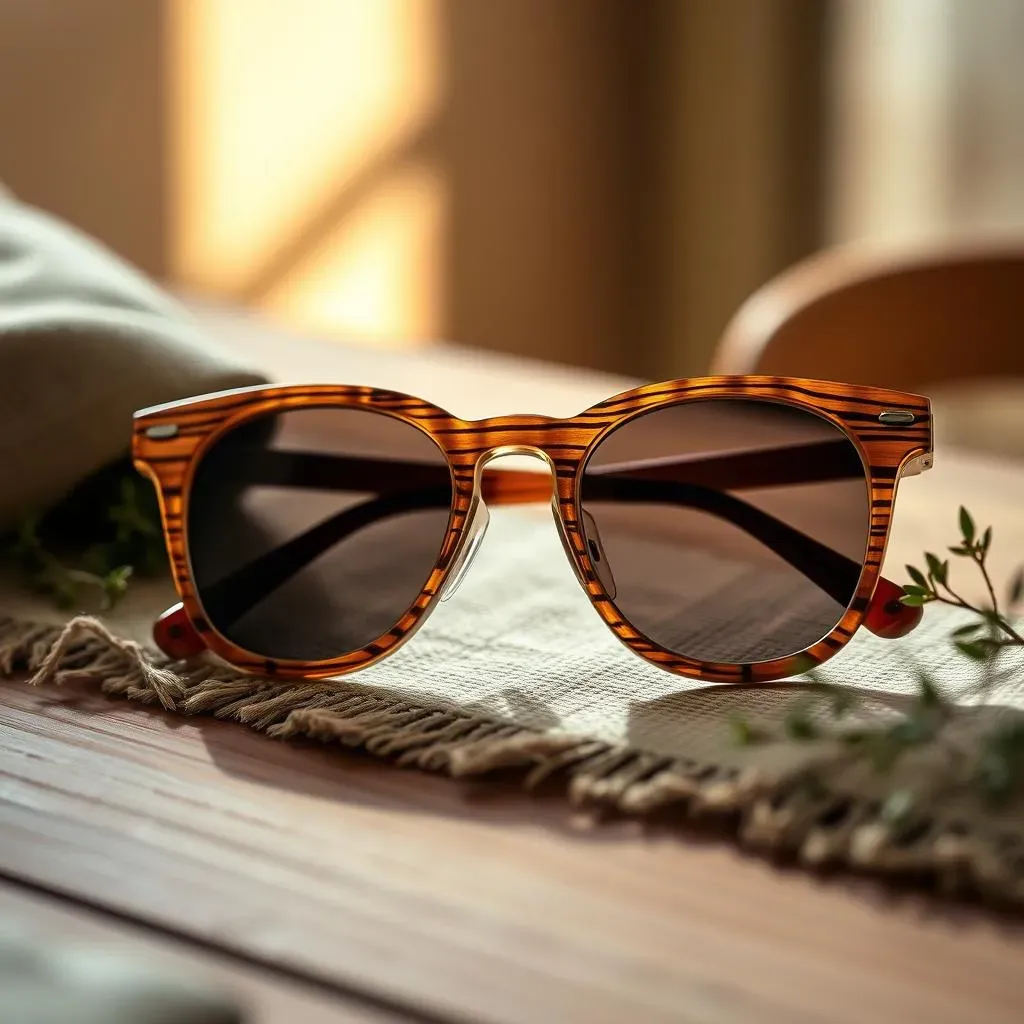Table of Contents
As the world shifts towards a more sustainable future, the demand for eco-friendly products is on the rise. One industry that's making strides in this direction is eyewear, with the introduction of plant-based sunglasses. These innovative frames are made from materials derived from plants, such as castor oil, offering a guilt-free alternative to traditional plastic sunglasses. In this article, we'll delve into the world of plant-based sunglasses, exploring their benefits, top brands, and tips for choosing the perfect pair. Whether you're an environmentally conscious consumer or simply looking for a stylish accessory, plant-based sunglasses are definitely worth considering. With their unique blend of sustainability and style, they're poised to revolutionize the way we think about eyewear. So, let's dive in and discover the best plant-based sunglasses for a more sustainable you.
What are PlantBased Sunglasses and How Do They Differ from Traditional Sunglasses?
What are PlantBased Sunglasses and How Do They Differ from Traditional Sunglasses?
Introduction to Plant-Based Sunglasses
Plant-based sunglasses are an innovative and eco-friendly alternative to traditional sunglasses. Made from plant-derived materials such as castor oil, these frames offer a sustainable option for those looking to reduce their environmental footprint. Unlike traditional sunglasses, which are typically made from petroleum-based plastics, plant-based sunglasses are biodegradable and non-toxic. This makes them an attractive choice for consumers who prioritize the health of our planet.
The production process of plant-based sunglasses also differs significantly from traditional methods. Traditional sunglasses are often manufactured using fossil fuels, which contribute to greenhouse gas emissions and climate change. In contrast, plant-based sunglasses are produced using renewable resources, minimizing the carbon footprint of the manufacturing process.
Material | Traditional Sunglasses | Plant-Based Sunglasses |
|---|---|---|
Frame Material | Petroleum-based plastics | Plant-derived materials (e.g., castor oil) |
Production Process | Fossil fuel-based manufacturing | Renewable resource-based manufacturing |
Environmental Impact | Contributes to greenhouse gas emissions and climate change | Biodegradable and non-toxic, minimizing carbon footprint |
Key Differences and Benefits
So, what sets plant-based sunglasses apart from their traditional counterparts? For starters, the frames are made from a unique blend of plant-based materials, which provides exceptional durability and flexibility. This means that plant-based sunglasses are less prone to cracking and breaking, making them a great choice for outdoor enthusiasts.
In addition to their eco-friendly credentials, plant-based sunglasses also offer a stylish and fashionable alternative to traditional frames. With a wide range of styles and designs available, consumers can choose from a variety of frames that suit their personal taste and preferences. Whether you're looking for a classic aviator style or a trendy cat-eye design, there's a pair of plant-based sunglasses to match your unique sense of style.
- Durable and flexible frames
- Wide range of stylish designs
- Eco-friendly and sustainable
- Biodegradable and non-toxic
Benefits of Choosing PlantBased Sunglasses: Sustainability and EcoFriendliness
Benefits of Choosing PlantBased Sunglasses: Sustainability and EcoFriendliness
Why Sustainability Matters in Eyewear
The eyewear industry has long been criticized for its environmental impact, with millions of pairs of sunglasses being produced each year using non-renewable resources and contributing to plastic waste. Plant-based sunglasses offer a game-changing alternative, allowing consumers to enjoy high-quality, fashionable eyewear while also reducing their carbon footprint. By choosing plant-based sunglasses, individuals can play a role in promoting sustainability and eco-friendliness in the fashion industry.
One of the primary benefits of plant-based sunglasses is their biodegradable nature. Unlike traditional plastic frames, which can take hundreds of years to decompose, plant-based frames can break down naturally, minimizing the amount of waste sent to landfills. This not only helps to reduce plastic pollution but also supports a more circular economy.
Material | Biodegradability | Environmental Impact |
|---|---|---|
Traditional Plastic | Non-biodegradable | Contributes to plastic pollution and waste |
Plant-Based Materials | Biodegradable | Minimizes waste and reduces environmental harm |
Eco-Friendly Production Processes
Another significant advantage of plant-based sunglasses is the eco-friendly production process. Traditional sunglasses are often manufactured using fossil fuels, which release greenhouse gases and contribute to climate change. In contrast, plant-based sunglasses are produced using renewable resources, such as castor oil, which is a sustainable and eco-friendly alternative.
Furthermore, the production process for plant-based sunglasses requires less energy and generates fewer emissions compared to traditional methods. This reduction in carbon footprint makes plant-based sunglasses an attractive choice for consumers who prioritize the environment.
- Reduced carbon footprint
- Lower energy consumption
- Use of renewable resources
As consumers become increasingly aware of the environmental impact of their purchasing decisions, the demand for eco-friendly products like plant-based sunglasses is on the rise. By choosing plant-based sunglasses, individuals can enjoy great-looking eyewear while also supporting sustainable practices.
Top Brands Offering HighQuality PlantBased Sunglasses for Different Styles and Preferences
Top Brands Offering HighQuality PlantBased Sunglasses for Different Styles and Preferences
Introduction to Top Brands
The market for plant-based sunglasses is rapidly expanding, with numerous brands emerging to cater to the growing demand for eco-friendly eyewear. From stylish and fashionable frames to durable and functional designs, there's a wide range of plant-based sunglasses available to suit different styles and preferences. In this section, we'll explore some of the top brands offering high-quality plant-based sunglasses, highlighting their unique features and what sets them apart from the competition.
One of the pioneering brands in the plant-based sunglasses market is Zeal Optics. Their frames are made from Z-Resin, a partially plant-based material derived from castor oil. Zeal Optics offers a wide range of stylish designs, from classic aviators to trendy cat-eye frames, ensuring that consumers can find the perfect pair to match their unique sense of style.
Brand | Material | Unique Features |
|---|---|---|
Zeal Optics | Z-Resin (partially plant-based) | Stylish designs, durable frames, eco-friendly |
Local Supply | Plant-based resin | Luxurious designs, sustainable manufacturing, biodegradable |
Rocket | Plant-based plastic | 100% UV protection, polarizing filter, stylish frames |
Standout Brands and Their Unique Features
Another standout brand in the plant-based sunglasses market is Local Supply. Based in Sydney, Australia, Local Supply is leading the way in sustainable eyewear, producing luxurious frames from plant-based materials. Their commitment to eco-friendliness extends to their manufacturing process, which prioritizes biodegradability and minimizes waste.
Rocket is another brand making waves in the industry with their plant-based sunglasses. Their frames are designed for outdoor enthusiasts, offering 100% UV protection and a polarizing filter to reduce glare. With a range of stylish designs to choose from, Rocket's plant-based sunglasses are perfect for anyone looking for a durable and eco-friendly accessory.
- Zeal Optics: Stylish designs, durable frames, eco-friendly
- Local Supply: Luxurious designs, sustainable manufacturing, biodegradable
- Rocket: 100% UV protection, polarizing filter, stylish frames
These brands are just a few examples of the many companies pushing the boundaries of sustainable eyewear. As the demand for plant-based sunglasses continues to grow, we can expect to see even more innovative designs and eco-friendly materials hitting the market.
Tips for Buying the Perfect Pair of PlantBased Sunglasses: Considering Face Shape, Lens Type, and Frame Material
Tips for Buying the Perfect Pair of PlantBased Sunglasses: Considering Face Shape, Lens Type, and Frame Material
Understanding Your Face Shape
When it comes to choosing the perfect pair of plant-based sunglasses, understanding your face shape is crucial. Different face shapes require different frame styles to complement their features. For example, if you have a round face, you'll want to look for frames that add angles, such as rectangular or square shapes. On the other hand, if you have a square face, you'll want to soften your features with round or oval frames.
Here are some general guidelines for matching frame styles to face shapes:
Face Shape | Recommended Frame Style |
|---|---|
Round | Angular frames (e.g., rectangular, square) |
Square | Soft frames (e.g., round, oval) |
Oval | Most frame styles suit oval faces |
Heart-Shaped | Frames that are wider at the bottom than the top |
Remember, these are general guidelines, and the most important thing is to choose frames that make you feel confident and comfortable.
Choosing the Right Lens Type
Lens type is another crucial factor to consider when buying plant-based sunglasses. Different lens types offer varying levels of protection, and some are better suited to specific activities. For example, if you're an outdoor enthusiast, you may want to opt for polarized lenses, which reduce glare from water or snow.
Here are some common lens types and their characteristics:
- Polarized lenses: Reduce glare, improve visibility
- UV protection lenses: Block 100% of UV rays
- Blue light blocking lenses: Reduce eye strain from screens
- Mirrored lenses: Add style, reduce glare
Consider your lifestyle and choose lenses that meet your needs. If you're unsure, many plant-based sunglasses brands offer a variety of lens options, so you can choose the one that's right for you.
Selecting the Perfect Frame Material
Plant-based sunglasses frames are made from a variety of materials, each with its own unique characteristics. When choosing a frame material, consider factors such as durability, weight, and hypoallergenic properties. For example, frames made from castor oil are lightweight and flexible, while those made from bamboo are extremely durable.
Here are some common plant-based frame materials:
Material | Characteristics |
|---|---|
Castor Oil | Lightweight, flexible, hypoallergenic |
Bamboo | Durable, sustainable, natural look |
Recycled Plant-Based Plastic | Eco-friendly, affordable, stylish |
Ultimately, the choice of frame material depends on your personal preferences and needs. Be sure to research the materials used by different brands and read reviews to find the perfect pair for you.
Additional Tips for Finding Your Perfect Pair
In addition to considering face shape, lens type, and frame material, here are some extra tips to keep in mind when shopping for plant-based sunglasses:
- Try before you buy: If possible, try on sunglasses before purchasing to ensure a comfortable fit.
- Check the warranty: Look for brands that offer a warranty or repair service to protect your investment.
- Read reviews: See what other customers have to say about the sunglasses you're interested in.
- Consider the price: Plant-based sunglasses can range from affordable to luxurious, so set a budget and stick to it.
By following these tips, you'll be well on your way to finding the perfect pair of plant-based sunglasses that combine style, sustainability, and functionality.
Embracing a Sustainable Future with Plant-Based Sunglasses
In conclusion, plant-based sunglasses offer a stylish and eco-friendly alternative to traditional eyewear. With their sustainable materials, reduced carbon footprint, and trendy designs, they're an excellent choice for anyone looking to make a positive impact on the environment. As we continue to navigate the challenges of climate change, it's essential to consider the environmental implications of our purchasing decisions. By choosing plant-based sunglasses, you're not only protecting your eyes but also contributing to a more sustainable future. So why not make the switch today and experience the comfort, quality, and eco-friendliness of plant-based sunglasses?
